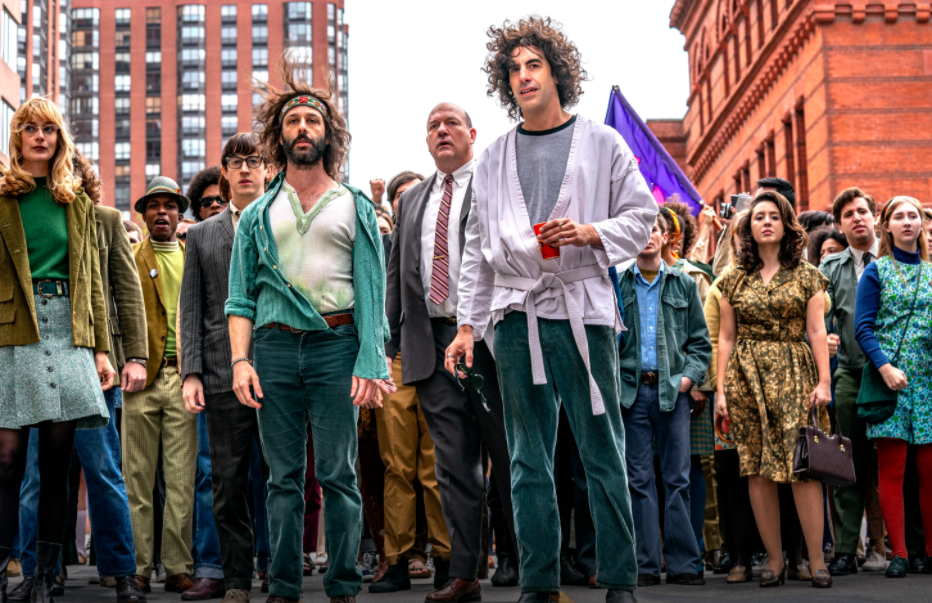
The Trial of the Chicago 7 should be taught in every history class. It ranks with All the President’s Men and Good Night, and Good Luck as movies that bring American history to life and put it in perspective.
Watching Chicago 7 doesn’t require knowledge of the current protests across America. However, an astute observer can’t help but see the parallels between modern-day protests, the current treatment of black men by police, young people fighting to be heard politically, and cries to protect the country from the “radical left.” In some ways, the film is surreal because we witness similar events on the news every day. In other ways, whether intentional or not, Chicago 7 follows in the tradition of M*A*S*H, which used the Korean War as a background for commentary on Vietnam, and Arthur Miller’s The Crucible, which used the Salem Witch Trials as commentary on the Red Scare.
While the movie plays with the timeline of actual events, so does every movie that covers history. At over two hours long, writer-director Aaron Sorkin had to come up with some way to keep our attention. He very effectively keeps viewers engaged by breaking up court room scenes with scenes of Abbie Hoffman (Sasha Baron Cohen) doing what can loosely be described as standup, the titular Chicago 7 back at their headquarters, and footage of the riot. The scenes demonstrate that Hoffman kept his sense of humor even as the others focused on the seriousness of the charges against them and that the Chicago 7’s intentions were intentionally misrepresented by law enforcement and the court system.
Throughout the film, it is made clear that there are three separate groups of people who make up the Chicago 7, all brought together to protest the 1968 Democratic National Convention without previously knowing each other. This is Sorkin’s way of emphasizing the fact that the three groups barely knew each other prior to the trial. Also, each group had a different philosophy and approach to dealing with authority forcing young men to fight in an unpopular war.
An eighth defendant, political activist Bobby Seale (Yahya Abdul-Mateen II), who co-founded the Black Panther Party, had his case dismissed because: 1. He wasn’t even at the riot. 2 The police officers beat him up and shackled him in the court room. Seele was only included to have a black defendant who would make the group seem scary. Also represented in the courtroom were Abbie Hoffman and Jerry Rubin (Jeremy Strong), who co-founded the Youth International Party (Yippies) and felt the only way to fix a broken system was to peacefully destroy it. Fellow Yippie, Lee Weiner (Noah Robbins) joined them. Tom Hayden (Eddie Redmayne), Rennie Davis (Alex Sharp), and John Froines (Daniel Flaherty) represented the Students for a Democratic Society. David Dellinger completed the Chicago 7, but was not affiliated with a formal group and was there as an antiwar protestor.
Even though all 7 played a role in the protests and Lee Weiner and Rennie Davis had more severe charges brought against them, the movie depicts Abbie Hoffman and Tom Hayden as the two most important and focuses on the dynamic between the two very different men. Hoffman and Hayden only agreed on three things: that the police started the riot, the system was broken, and that the war in Vietnam needed to end to stop the unnecessary deaths of young servicemen.
Hoffman and Hayden were polar opposites. Hoffman was fine with radical measures and disrespecting authority figures who do not deserve respect. Hoffman would openly mock the judge and the judicial process in court. Hayden did not like authority dismissing young people, but still respected authority through seemingly minor actions like rising when the judge exited the courtroom. The tension between the two men consistently pulls you back in because, unless you are familiar with the outcome, you think Hoffman will get them all sentenced to jail or Hayden will sell the others out to get a lighter sentence.
The Trial of the Chicago 7 is an important history lesson for everyone. You can’t ignore that the movie bears Aaron Sorkin’s fingerprints. Hayden is a classic Sorkin character, who wants to fight the system by working within it. Also, there is an over-reliance on dialogue, which simultaneously makes the film feel long yet makes the riot scenes’ bloodshed more impactful because it contrasts with the courtroom’s decorum. However, Chicago 7 does not feel like Sorkin needed a venue to air his liberal politics. It is a genuine lesson in an often-forgotten part of American history.


Great review! Now I will watch.